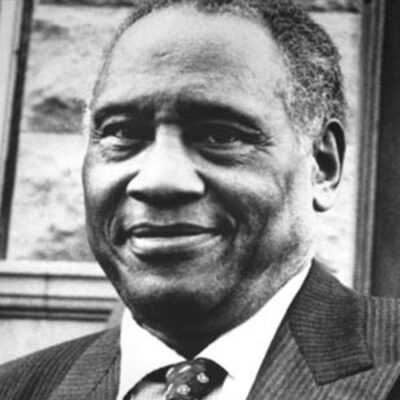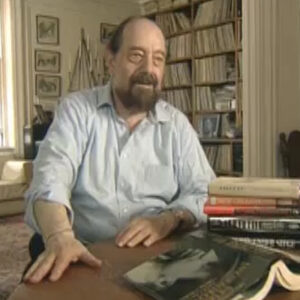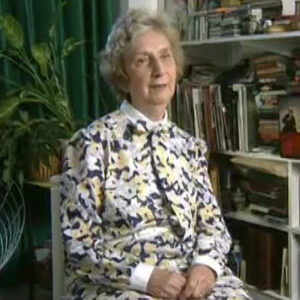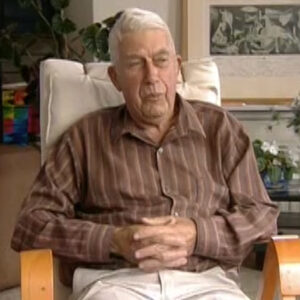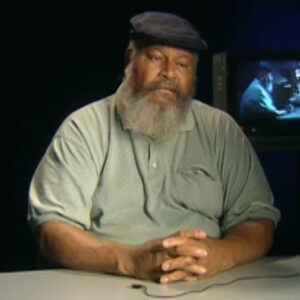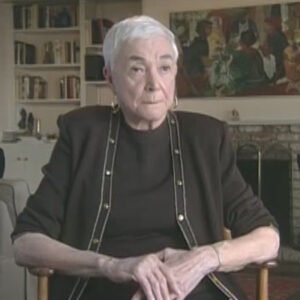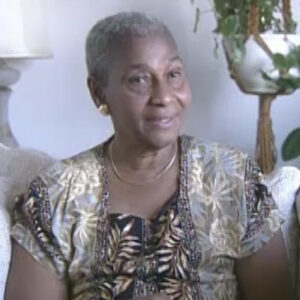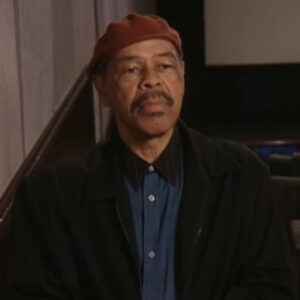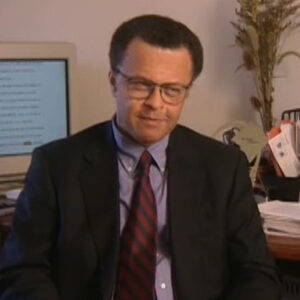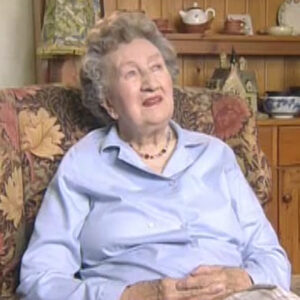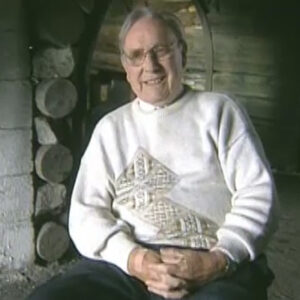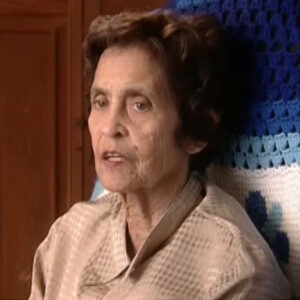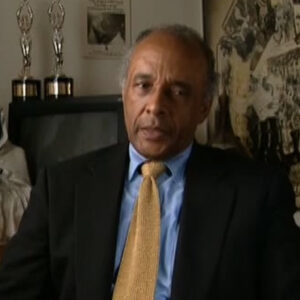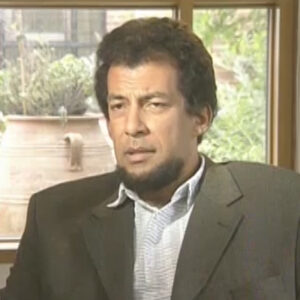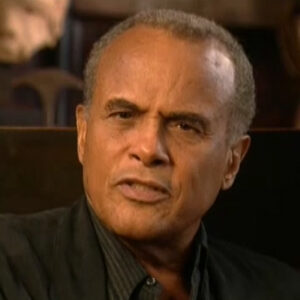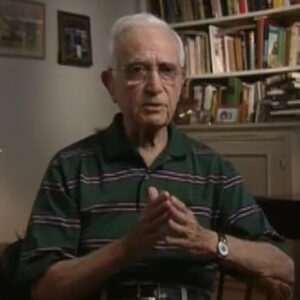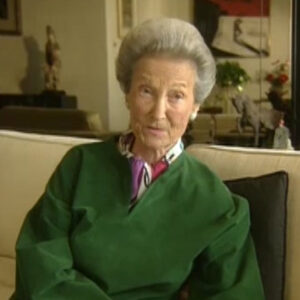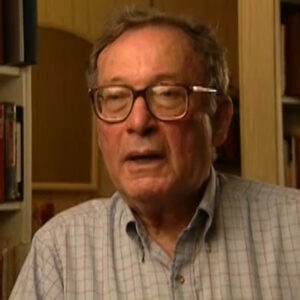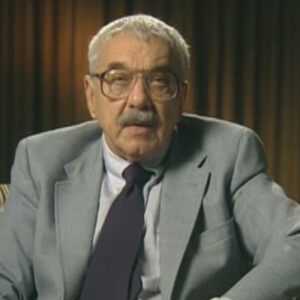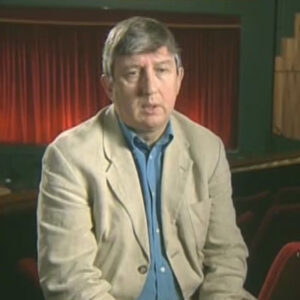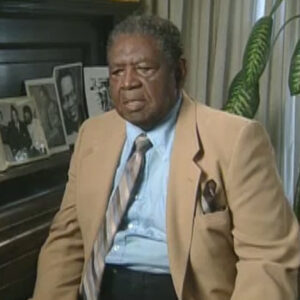Speaker And get to know really quite well.
Speaker OK, how did that happen exactly? Well, because he came here and somebody in the theater said he was looking for digs, lodgings, and I think somebody went to his mother and said, you got a large, you know, wing, their spare wing, the three rooms. So he moved in on those spare bedrooms, had one as an office and one of the a bedroom. And I don’t know, because that’s where Joe joined him. Joe came up from London somewhere. Who was Joe Andrews? He was his old sort of attendant who arranged things for him, all sorts of things, arranged outings, arranged his business matters, I think dealt with his letters to a certain extent, sort of a personal secretary, a very personal secretary. One of his jobs, I think, was to keep people free of, uh, commitments to his wife. And he was very busy, uh, keeping other groups, Paul, before him for that.
Speaker Yeah.
Speaker I mean, he says when you first heard I mean, what were the circumstances, as you first heard, that he was that you would actually get to work?
Speaker Oh, this relation with the mother.
Speaker We were we were very close friend. Family Circle. That raises something very interesting. It was Stratford. I mean, I know that all the the the left wing parties in Britain claim it was their pressure that got him out of America. There’s a degree of truth in that. But the thing that really moved it was an application from the Royal Shakespeare Company, where it was before it was royal, it was Shakespeare. At that stage, no, it had become the Royal Shakespeare to Robeson to come and play Othello.
Speaker Could you start over? And then it was the that was good.
Speaker You can say that it was that it was the pressure and the invitation from the Shakespeare Company to come and play Othello that really broke the logjam. I think the Americans felt that they would be so embarrassed if this great artist were refused permission to come and play Othello in Stratford. And I really do. We all thought at the time it was Glenburn, I’m sure, who was then the director who’d arranged this specifically for him to play Othello, but as a secondary consideration that it might release him from the bondman that he was suffering in in America. Do you think that’s true? I think there’s some truth in that. I mean, I don’t think it was simply political pressures, because I don’t think the American government was inclined to listen to the Communist Party of South Wales or the Glasgow Collective or whatever. I think it really was. I think the key that released him and returned him his passport. Interesting.
Speaker Interesting. And had.
Speaker Wentzel, so do me a favor to straighten your tie. Oh, thanks. That’s right. Yeah. So were you politically active when you heard he was coming?
Speaker I mean, no, no. As far as Paul was concerned, you mean you know, you just. Oh, I’ve been politically aware all my life. I was brought up on a professorial chap in Edinburgh who is extremely political, was a member of the one of the founders of the Peace Pledge Union before the war in Utrecht, I think. And every breakfast and I stayed with him with my mother and father were in Africa. We had a lecture on this dreadful National Socialist leader. Adolf Hitler, quite extraordinary and pounding the breakfast table, you know, but marmelade jumping. He was no pressure, so he did the sort of did his performances.
Speaker So so when you heard that he was the US who was going to be inside but and in your mother in law’s house.
Speaker Oh, I thrilled Pink when I heard that was going to happen. It came out of the blue because it was the last thing I ever thought it would would occur. And although she was a very old fashioned, very courteous English woman, she got on with poor marvelously and he was very, very fond of it, used to hug her in the kitchen and, you know, extraordinary sort of close relationship. And she had great regard for him. And Endearments book. I’m quoted as saying that she.
Speaker I had never heard of him, which meant, he says, is absolute nonsense. I think I’m quoted in this book as saying that I’m not sure that I ever said that. But Duberman had a headache at the time.
Speaker People said, well, don’t forget to record this.
Speaker So so in terms of talks that you had with Rosen, what kind of discussion did you have?
Speaker It was largely political because it was the time of the 1950s. How are we doing things? Are we still running? Oh, my dear heart, I thought we are still chatting away. Do forgive me. Sorry, I want to start again. Start again on that bit contact with the poor.
Speaker Yeah. I mean what was the what was what was, what was the what was your reaction when you heard that it was coming and what kind of conversations that you had with them while it was.
Speaker Oh I was thrilled. Pink. I never thought that I get physically close to Paul and sort of in a sense, visit him where he lived with my mother in law and most of my conversations with him. It was about the time of the 59 political approach to the election were entirely, practically entirely political. A bit about Africa, not much about the theater, but every conversation was some some comment on what was happening at the time. And he was an absolute revelation to me. His determination is sort of immense strength that he poured out. And I was complaining like mad about the treatment at the camp of the Africans have been killed in Kenya. I was complaining about the bulls up in Cyprus and he said suddenly, profound observation. He said, you have no right, this great rich brown voice. You have no right to complain. You’re not involved. What do I do? I go round to the local Labor Party, which is a two man dog and a broken table, and I volunteer to join in. And that’s how I then went that that election in 59 to make my first political speeches, which led to my later on being selected for Smethwick, where the appalling wrests election had taken place. And I have to be careful how I describe him. But he was a man of the extreme right who had one Smithie from Gordon Walker, who was going to be our foreign secretary. And. His motto. He always said he wasn’t, but his supporters use the motto, If you want a [Unrecognized] neighbor, vote Labor, which was charming. And I was so incensed at this that when the possibility of being selected for a seat for the sixty six election came up, I was very lucky. There were I don’t know how many candidates, but I got the selection and I was in the House having won that election for 31 years. And that all started with Paul’s extraordinary phrase.
Speaker Did you tell him that you had to tell him that you had.
Speaker I don’t think he ever knew that. I don’t think we discussed it in Philadelphia much later when we met him before his death.
Speaker I don’t think that came up. OK, now, uh.
Speaker John Chambers, I mean, to him, yeah, Joe, I think James Andrews, Joe Andrew, uh, he was the he arrived with the did he come later?
Speaker He wasn’t in the first package. Arrived at the House. No, but he certainly joined Paul very shortly after he came here. And Paul really did defend on him, depend on him. And to an extraordinary extent, he was this sort of general factotum, organized everything that he had to do. Later on, cars, coped with his mail and made sort of social arrangements for him.
Speaker Now, in terms of social issues at this point, what was the state of his relationship with his wife and what was it was pretty obvious that there although there was immense mutual respect.
Speaker And affection, he was happy not to have her to near him all the time, and she lived most of that time, I think, in a London flat or something, and he was then free to pursue his other interests. And although he was then in his early 60s, he was a very healthy early 60s and his sexual life was really pretty full.
Speaker He went out to London. I think there were contacts there. I think there was one particular American girlfriend who came over during that period.
Speaker But there were certainly locals in the sense of Brits or English women with whom he certainly enjoyed his spare hours.
Speaker It was sort of well known that this was happening.
Speaker I mean, you know, I think it was pretty, pretty kept pretty quiet. And it’s an it was an extraordinary relationship because he dedicates his book Here I stand one marvellous coningham to to Islam. So I think as a people working together, they were immensely close. And he had great regard for her drive and her abilities. But it was, I think, a marriage that had probably run out of what one called real passion and love.
Speaker Well, you know, there’s a there’s a school of thought that said from the beginning there were there were problems even from the beginning, really? Yeah, they were. Because even we interviewed people who. From his point of view, it was really almost the career planning move as opposed to it’s really interesting that, well, if that was the plan, it worked very well because she she certainly helped him politically.
Speaker I have no doubt about that. And he had great respect for her, I think.
Speaker But it just it wasn’t a warm, mutual, happily married, married couple in the conventional sense.
Speaker Did you could you talk about the play, the fellow that is? How many times did you see it?
Speaker I think I saw three times. And one has to be honest, it wasn’t the greatest performance. I’ve seen much greater Othello’s, but he was a two world. He was very stiff in his bodily movements. He had the most appalling costume designed to emphasize size and shape, and he had a ludicrous little helmet that just looked silly on him. But once he opened his voice, once he opened his mouth to speak the verse, it was staggering. The great address to the Senate explaining why he wants to marry a banshee. His daughter was magnificent. I mean, I’ve never heard it spoken like that. It’s a great area, of course, in the opera, but spoken. I’ve probably never heard that particular speech better done. And in the in the Quarrell scenes, he was quite effective. But I have to say he didn’t have the best yogo, which didn’t really help the intensity of those exchanges.
Speaker Did what was the reaction of the public and also what was the reaction of the critics that you knew it got fairly good notices.
Speaker The play not not excellent notices. And I think, you know, most people are not really very critical. They go and listen to anything great. They don’t study the subtleties of performance and subtleties of presentation. It was well thought of. It was well regarded, and it certainly got crowds attending it. But for a for an efficient office, you know, it was cut that way for somebody for somebody who seen a lot of Shakespeare, for somebody who’d seen and played in a lot of Shakespeare, it simply wasn’t the best Othello. One has to be honest about that. But it was still a remarkable spoken performance with Stratford at that time.
Speaker Was it the theatrical draw that it is now? I mean.
Speaker Oh, yes. Oh, yes. Yeah, yeah. Well, Stratford was always, since its foundation, an international magnet for people who are interested in the playing of Shakespeare. And it had a sort of a sort of certainly a regional appeal in terms of Europe and America. Because when I first came here before the war, no, it’s absolute nonsense. And it wasn’t for let’s start that thing again. The question was about strength here. Sorry, is it driving a man?
Speaker I’m sorry. That’s very untidy.
Speaker Very sorry. I start that one again.
Speaker I’m trying to find out how Stratford was perceived as a theatrical tour at that time. Was it was it a big deal that he came because it was?
Speaker Oh, it is an immense deal that Robson came, but it was a very distinguished theatre for many, many years before that, before the war, it had had the very best British actors in it and some extraordinarily good traditional performances. The stuff spoken perfectly with some modern actors of Lost and very interesting traditional productions. But after the war, other directors started to play about with the presentation of plays. But it then became, although there had always been American visitors after the war, it became an international attraction. In a sense, I don’t think it had been the greater use of air transport and all those things, and it did still have staggeringly good performances productions. But when Paul arrived to play a black Othello, it was quite a quite a breakthrough. And there was great excitement at the prospect of this great artist playing the part.
Speaker Was he do you think he was the first black person playing Othello at Stratford or certainly at Stratford?
Speaker Yes, certainly at Stratford. There might have been a dance. I can’t think that there was a black Othello in Britain before that. But he was certainly the first black Othello in Stratford and.
Speaker And so. Uh.
Speaker The.
Speaker Now that the poll and when you’re talking politics, did he express any interest in staying here or did he want to go back to the states?
Speaker I had a funny feeling about Paul at the end of the season and afterwards when he stayed on in Stratford for some time, it was lovely and quiet and he wasn’t too close to the center of things in London. He had his time on his own or supposedly on his own. I sense that he was like an old dog wanting to go home. He was tired. He was not. Well, this whatever the affliction was that eventually really destroyed him, was beginning to affect him. He was he got more and more depressed and he had a flat in London, which we visited a couple of times, I think. And I could see this gradual deterioration in his spirit more than anything else. He seemed to have lost something. And I always thought at that stage in his life he’d done this final obviously his final Othello, that he’d begun to realise that all his great hopes have gone, his great gods had deserted him. Communism had failed him and failed itself, of course, and the American democracy, which he must have believed in ardently as a young man. Had also failed him, and he seemed to be he seemed to be immensely depressed when he thought about these issues because he was such a political animal. I mean, he lived and breathed politics as well as being a great artist. And it was depressing to see him declining in that extraordinarily obvious way out now.
Speaker So now years he goes to Philadelphia and you’re one of the few people to visit it. And then you saw the beginning. What was it like to see him in Philadelphia?
Speaker Oh, it is immensely disturbing, but my wife and I had gone to a conference in Philadelphia to do with southern Africa at that stage, and we’d been in touch with Paul Junior and we’d said armadas, it would be to visit his dad. And there wasn’t any reluctance on the young board’s part. He said, well, he tried to fix it and eventually he wrote us or phoned her saying that, you know, his father would be ready to welcome us whatever the day was. So we went into this brownstone house area in Philadelphia and were let in by a very, very elderly, white haired woman, very distinguished and who I think is elder sister. And we went and sat at a table and I think she prepared a cup of something and a sandwich or two. And Paul came down, I suppose, about ten minutes later and I was quite amazed.
Speaker The change in the man.
Speaker It’s sort of shrunk his whole body and sort of come in on itself, and he was utterly silent. He didn’t say a word and he grunted, I think, when we said, Hello, Paul, lovely to see you. We had a long conversation on our own, but to him, if you know what I mean, and he didn’t respond at all, he didn’t utter a word. He shook his head slightly or sort of bowed his head a bit. And it was only when one talked about things like unity theater and Alphabet’s, whom he was very fond of, that he’s sort of a momentary light, came into his eye and there was a recognition of something and a sort of him. But the rest of the time he simply didn’t utter a word. And I think even when we had farewell to him, it was more a grunt than a word or two. Extraordinary, disturbing.
Speaker And how much longer was the lie? Well, I think he died within the next two years. I don’t remember the actual year of the conference, but he was very near the end.
Speaker And it was quite clear he was he was declining very, very fast.
Speaker OK, you’re a political animal, too, I mean. Yes, yeah. Motivated by Paul in a way. I mean, in the long run, what do you think? I mean, did he make a difference? Was he just a sort of a lone soldier struggling in the wind?
Speaker Oh, no.
Speaker I think the fact he had and I think he had an immense effect, not because he was a political animal, but because he was a great, great artist and people were prepared to listen to Paul because of that immense talent. But he was immensely effective, I think, in his political influence, certainly in the left wing in Britain. He was very, very, very highly regarded as one of the chaps who was making a breakthrough. Well, I can’t judge his history in America because I’m not qualified to do that. But when you think that he had friends like Pendent Nero, show him, like every great leader in the world, invited Paul for conversations, not about minor issues about politics. So he was extremely well known internationally for his political beliefs. And there’s no way he could have had anything other than a very, very benign influence on the people he met and lectured and talked to. Great, great influence, I thought, but he himself, I think at the end felt he hadn’t succeeded.
Speaker I really do. Tragedy, absolute tragedy.
Speaker Did you did you when he was boycotted, did you participate or hear about, you know, the only took his passport away?
Speaker Oh, yes. I was very well aware. A lot of political people in Britain were. I mean, the large number of members of the Commons long before I got into it, who knew Paul and were great admirers of his and political supporters. He’s certainly certainly been known since before the war in Britain because he came over and played Othello with Peggy Ashcroft as Desdemona. Uh, he was a profound influence, but without any immediate effect. But he must have certain seeds of awareness of the color problem and the treatment of America, of Negroes in America. He was an educator of influence all over the world in what he believed, but he had this great gift that sort of carried him into all this involvement.
Speaker Yeah, one of the things we discovered that.
Speaker OK, so this may be outside of the area, but, uh, there’s a school of thought that says that he actually, if culturally affected, left culture as well.
Speaker Oh, I’m sure there’s no way that that could have failed. He was an immense influence, and I’m so surprised and pained. But nowadays, even people politically aware and culturally aware. So who when you mentioned Paul and then they ever hear a recording of him? He’s not played enough, we have this awful crappy music, so called music now, and people like Paul, you rarely hear a recording of him at his height and.
Speaker In England, yeah, uh, he was what would you call him, like a pop star, or was he an intellectual pop star or how would I know he was a cultural influence?
Speaker Well, I don’t know. Did we have the word pop star, the phrase pop star before the war? I don’t know. I don’t think so. So he he was never in that sort of ridiculous bracket because most of the stuff they’re saying is crap. But he was certainly immensely popular before the war because his record sold extremely well.
Speaker He came and worked in Britain in films and concerts. And he certainly was was immensely appreciated. He was a very great artist all his life, as far as I’m aware. And the moment he came abroad, he was also a great artist in throughout Europe and and and much wider India, China, the whole world.
Speaker Uh, this is a bit delicate, but could you sort of speculate about why he was so sexually active?
Speaker I mean, uh, you know, him is generic.
Speaker Like, I think most great men and politicians that are among the worst offenders, perhaps great men with great energy and great beliefs seem to have an additional drive, which is the sexual drive was only got to think of like George. And I don’t want to mention other distinguished figures, but the great men seem to have this extra. I think most fellas have it. They just perhaps don’t get the opportunities that people like Paul got. And he certainly it was part of his personality. There was no way you could subdue that and not fulfill himself sexually. And lucky girls. Sorry for that sexist remark.
Speaker That’s quite good. I was just going to say. OK, the first thing is, did you eat, see, and what were your impressions of her and oh, we met her quite a lot of times because she came up to Stratford every now and again.
Speaker I don’t think she actually stayed in a shelter. I can’t remember that. But she was very he was very much. Let’s start again. Let’s start again. Sorry. I’m just trying to think if she did stay in Stratford, that threw me in the cottage.
Speaker I don’t forget it, forget it, it’s not again. Uh, did you actually meet and see and what was she like?
Speaker Oh, she came up from London quite a lot of times to meet Paul and be together, not too frequently. And that was fairly carefully controlled, I think, by Paul and by Jo Andrews. But she when she did come up, she was very pleasant and friendly. But there was a sort of steeliness about Essie, which made it difficult to make immediate real contact with her. She was very defensive of Paul, and he was always on his best behavior, of course, when she was there. But she was an impressive woman who you say defensive.
Speaker Was she sensitive about him or was she trying to protect him?
Speaker There was a sort of feeling of mothering him, which I don’t think he much liked, but I can’t really judge. I don’t know. I didn’t see them often enough together to be able to make a real judgment on the sensitivities of that relationship. But it was it wasn’t an easy one.
Speaker Yeah. You know, and friends.
Speaker Oh, everybody met. He went to a dance once that we organized for the Re-created Labor Party in Stratford. And he was immediately the center of attention and he shuffled around the floor with various ladies who wanted to be danced with. He was always extremely sociable, extremely attractive. He his circle was pretty limited. It was the theatre. And I think he was quite happy to get away from the theatre, actually, except in performance. But he did make friends. I mean, the people who met him and my mother in laws all took to him immediately. And he was always so responsive in friendship.
Speaker And there was a wonderful period when he stayed on after the series the season. And we had a big Christmas party with friends coming in from the town. And Paul was the centre of this. And we all got a bit a few drinks and Christmas feeling in there. And we had a sort of sing song from Paul.
Speaker He’d break into a numbers, he’d dance around holding some girl or other, or he’d stand and just give us a rendition of something absolutely magical sort of private concert. And he was great fun. And the ladies couldn’t wait because he danced in a rather slow sort of shuffling way. He wasn’t a great gigolo, but and he danced with every woman at the party. I would think in turn did his duty in a social sense that they loved it. And I think he did. He was he was so relaxed on those occasions. He was like a different Paul just at home and happy.
Speaker And such fun to be with really one he after he is the play. Yeah. Why did he stay here?
Speaker I think he just liked the quiet. I think he liked being out of things for a bit and it was just a sort of rest. And it was later that one began to detect this growing pessimism of his, which I think within the next year or so had really developed into such a condition that he had to go and have this hospitalization in London or outside London. And I think that’s another story. I’m not sure that that treatment did any good to him at all. And I’d like to know what the medical records say about that. I did try to get them from the hospital, although then think closed down and they weren’t available, which is a bit unbelievable about medical records.
Speaker Have you heard anything about that?
Speaker I mean, I’ve never been able to find out what he was supposed to be suffering from. I think we had some strange story at the end that his skull had shrunk. Some extraordinary know how that happens or why that happens, I don’t know. But I I’d like to think that that treatment and other treatments that he received, both in America and in Russia, actually did him any good because allopathic medicine is a suspect matter as far as I’m concerned, usually, right?
Speaker Yeah. This is another theory says that he was basically.
Speaker They were there as part of a campaign to destabilize them by the intelligence forces of America, that I believe that I would believe that because what happened to him was too extraordinary to be explicable in medical terms, ordinary medical term. And he was a I mean, this is a measure of what an immensely important man he was, that the Secret Service or whoever get instructions to destabilize a figure like this is an immense compliment to the man. And I really do fear that something like that went on. I don’t think anything else is can explain his his. Immense sort of decline.
Speaker The reason I ask the.
Speaker Oh, this is sort of your own personal history. I mean, uh, I mean, you were born in Africa. Can you just tell us very briefly. Yeah, OK, I start. Well, just so I was born in Africa and then your parents were missionaries.
Speaker Robeson, in my life was an early and important figure because my mother and father were Scottish missionaries in Central Africa and spent their lives there and came home on furlough. And I was brought up, born and brought up in Tanganyika. And what was then.
Speaker Yes, land, until I was about five or six. And I came home speaking English, but we preferred to speak and Jahangir, which are the two local languages. And I was immensely impressed because my father was a sort of living saint. He really was the most extraordinary man.
Speaker And it’s interesting that Paul had exactly the same feeling about his father when you read his his hero stand, and all my life I was very aware of social needs, perhaps not in a political sense, until I was at school when you had school debates. And I was brought up by an old professorial character in Edinburgh who’d been a very politically conscious chap before the war, making attacks on that awful national socialist, Adolf Hitler, being a founder member of the Peace Players Union. So my whole political background was very strongly influenced by political considerations. But Paul was the one who triggered off the intent to get involved and actually do something about it.
Speaker But, you know, as far as a cultural force before it, the right as a as a young boy listening to his records.
Speaker Yes, I wasn’t thinking about the political thing at that stage. There was in my early teens, but the music and my mother was very musical and love playing music of all sorts. And of course, Paul was one of the great artists she played.
Speaker Good to know. Not perfect. OK.
Speaker Did their best warriors well, you can take the camera. I mean, you’ll be on camera with are we are we running?
Speaker Yeah. Sorry. Yeah. Shrugged it off. Yeah.
Speaker Well, it’s those comments to you, the few that you perceived about his reaction to the production.
Speaker He never, ever made, as far as I remember, any critical comment about the producer or the costumes or anything. I think he probably had a few, but he wasn’t prepared to make public comment about them. But it wasn’t the best production and the costume was a farce. But he didn’t really he didn’t want to raise his resentments about these matters.
Speaker Uh.
Speaker What was his behavior like when he was here?
Speaker I mean, was he the dutiful husband or was he like a date or was it he was on his very best behavior, his best behavior and restrained. I mean, there was a strange feeling that he was restrained and both in what he said and what he did, his normal sort of bonhomie seemed to depart.
Speaker We’ve really covered a lot. I can’t really think of anything.
Speaker Well, you’re going to cut all this down to about three and a half minutes and something like the right position.
Speaker OK, uh, you said that you thought that he felt that the two guards failed him.
Speaker Do you think?
Speaker I mean, you’ve talked about his effect on the world.
Speaker Yeah. But do you think that they failed?
Speaker Oh, I think American democracy failed him, certainly. And it’ll be interesting historically to see what effect his life has had on that eventually. And I think the other great God I the communist belief or interest that he had also failed him, which must have been tragic for him because he was an immensely devoted to public welfare, public wheel, and to find that these two systems, neither of them worked in terms of his own community, but also, of course, in terms of the impoverished, the underprivileged and all that. And he made people conscious in every conversation practically, that he had these great concerns and that not nearly enough was being done by the political masters of the world to to meet these great issues.
Speaker Now, based on that, then.
Speaker His life would be a warning not to be involved, but most people use him as a symbol of how you can make it.
Speaker Well, he certainly made a difference to me. I wouldn’t have been in politics in Britain at all if it hadn’t been for Paul. I think people who are not involved are immensely impressed by those who are their care and concern, but they don’t necessarily want to get into the sweaty work themselves. You know, they don’t want to throw themselves in. Somebody else can can do it.
Speaker But there were systems of government that failed him. And I think the awful thing must have been to be born in the great democracy and then have to fight as he had to fight physically sometimes against the appalling misjudgments of the the settler community. I mustn’t say that because that’s very unfair. Scrub that, scrub that, scrub that.
Speaker Well, OK, but start over because I think you’re on the same track. I mean I mean, here’s a guy who did fight at the end. You’re saying that he felt disillusioned.
Speaker Yeah, but you can use what was said before I get around that last ridiculous sentence. But what lessons can we learn from that?
Speaker Do you think I mean, because you’re a politician and you are activists. I mean, you’re positive, but you’re an activist.
Speaker Well, having been 31 years in the House of Commons, I have, to some degree, Paul’s disappointments. The system should have worked better. The people we were helping, both in this country and abroad, were not helped nearly enough. There was far too much self concern in my political life. Most of my colleagues and there was much too much keeping in with the prevalent view instead of people speaking out, which they should have been doing, particularly on foreign issues like Vietnam, like in South Africa, all those things. But in my view by most British politicians in Britain were minor matters. There were many who were made in primary matters and not nearly enough. And we allowed things to happen that should never have been allowed and should never have happened.
Speaker And can I just say that was a little bit iffy. Squeaking It would be instructive. I don’t if you say that again, I was. Where were we? Where we’re talking about we’re talking about really is the effect of Rosen as an activist. Well, let’s go back there, OK? And so and here’s a man who fought. For a set of principles. And in your view, you think that he felt disillusioned at the end, so therefore people who see his life is, isn’t it? Is it something that people should emulate or should it be a warning not to do it?
Speaker Oh, no, not a warning not to do it, because those who are concerned have a social conscience ought to get more involved in politics, whether they’re practicing politicians or whether they’re just people in the street.
Speaker But one of my regrets after my 31 years of life in the House of Commons is that I always thought far too many of my colleagues didn’t care enough, both about the underprivileged people in Britain and perhaps even more particularly about the appalling conditions and governments in places like South Africa and our treatment of of acceptance of treatment that would in terms I’m talking nonsense.
Speaker I know you go well when we got to know where you go. How much of that first stuff can you use? Not much. Not a lot of it. It says it’s just one little squeak. Yeah, let’s do it again. Let me just think what we’re talking about. Where are we going back to going back to I’m saying all roads and a life to fight.
Speaker Yeah, you say boy, at the end he was disillusioned. So therefore I say, OK, does that mean that people shouldn’t get involved?
Speaker OK, let’s take it back somewhere like that.
Speaker You basically say, yeah, they should. Yeah, yeah. Yeah. OK, so. He fought for principles disillusioned at the end.
Speaker Does that mean we shouldn’t jump in the fray?
Speaker Well, most people are never going to jump in the fray, unfortunately, but for those of us who have got actively involved in politics, the more converts we make, the better, whether it’s converts in the house itself or whether it’s converts among our community, because there is far too little concern about the profound issues of how we treat people in this country, the underprivileged, and how we treat people abroad. The appalling conditions in the colonies in South Africa, the appalling treatment in Vietnam of the native peoples there, and not enough politicians, in my experience, actually stuck out their heads on these issues. It was much easier to go along with the government’s views, which in issues like this were simply unacceptable to a small coterie of us. And I had much more admiration for those in the House of Commons who spoke out, even if it cost them jobs, even if it made them unpopular with the passing heads of the business. The our duty as politicians is to say what we think and be courageous about it. And Paul certainly was what I was going to say.
Speaker So maybe that’s the maybe that’s the lesson that Paul Ryan teaches to those of us who were nerem, to those of us who were, in a sense, converted by him.
Speaker Paul was an absolute prime example of how you take the job on and you fight the battle.
Speaker And he did.

